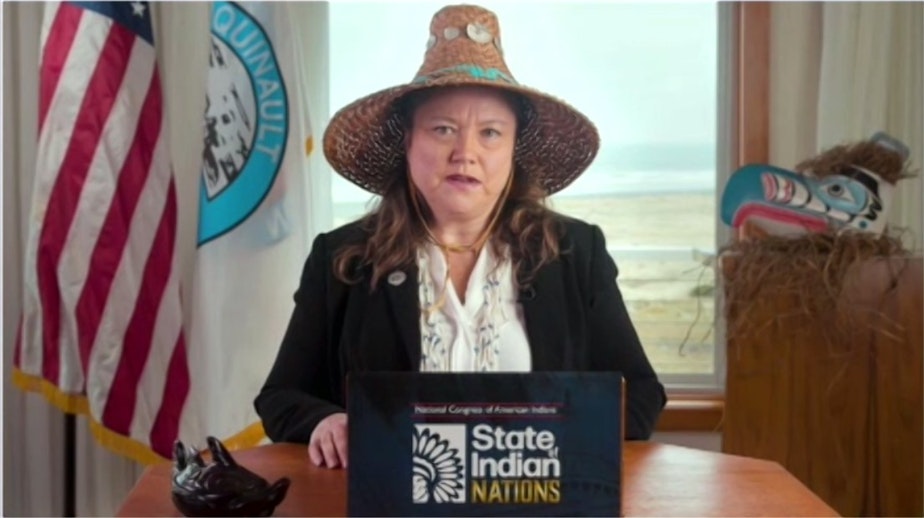Disparities faced by Native Americans 'a national disgrace', Quinault president says

The Quinault Indian Nation on the Olympic Peninsula is currently under three states of emergency.
In addition to a pandemic that has taken lives and stifled the tribal economy, ocean waves breached the village of Taholah’s seawall in January. The resulting flooding forced much of the Quinault Reservation's main village to be evacuated.
Meanwhile, a mudslide is undermining the only paved road to Taholah.
Quinault Indian Nation and National Congress of American Indians president Fawn Sharp said facing grave challenges is nothing new for Native Americans.
“We have been here many times before, and we have always persevered,” Sharp said in the annual State Of Indian Nations speech to the Native congress and members of the U.S. Congress on Monday.
Still, Sharp said the disparities faced by Native Americans today are “a national disgrace for a country that prides itself on staying true to its word.”
Sponsored
Sharp, an attorney and climate activist, became president of the nation’s largest Native American organization in 2019.
She said the United States’ “utter failure” to uphold its end of treaties signed with tribal nations continues to cause “wrenching pain” in Indian country.
“This nation was built and is sustained through the promises it made to tribal nations in exchange for millions of square miles of tribal land,” Sharp said. “These promises have no expiration date, requiring the United States to support tribal self-governance, education, health care and other key services forever.”
Sharp and other tribal leaders say early moves by the Biden administration make them optimistic the federal government will turn the corner on its long neglect of tribes and their concerns including climate change.
If President Joe Biden’s nominee for Interior Secretary, Rep. Deb Haaland, a progressive Democrat from New Mexico and the Laguna Pueblo Tribe, is confirmed, she would be the first Native American to head a cabinet-level agency.
Sponsored
In addition to being responsible for the nation’s treaty obligations to tribes, the U.S. Department of the Interior manages lands that produce 12% of the nation’s natural gas output and 24% of the nation’s oil output, Democratic Sen. Joe Manchin of West Virginia said as he kicked off Haaland’s confirmation hearing Tuesday morning.
Republicans were wary of the climate activism that tribal leaders like Haaland and Sharp have embraced.
“Frankly, your positions on energy are alarming to Mississippians,” Sen. Cindy Hyde-Smith of Mississippi, where the Interior Department oversees offshore oil and gas drilling, told Haaland.
In her speech, Sharp said she acknowledged the tension that many tribal economies depend heavily on environmentally harmful resource extraction such as oil drilling and that she would always respect tribal sovereignty.
Sharp said tribes nationwide were taking bold actions to fight and prepare for climate change that the world could use as a model.
Sponsored
The Quinault Nation is in the midst of relocating two of its villages to higher ground to avoid being swallowed by rising seas.
“Not only have we faced genocide. Every living thing is facing environmental genocide,” she said.
Tribal consent
Biden issued an executive order in January directing all federal agencies to engage in “regular, meaningful, and robust consultation with Tribal officials in the development of Federal policies that have Tribal implications.”
Sharp called on the federal government to do more to respect the rights of Indian nations to determine their own fates than just consulting tribes.
Sponsored
“We have the right as sovereign nations to say 'yes' or 'no,' and that right must be respected,” she said.
Washington State Attorney General Bob Ferguson adopted a policy of requiring tribal consent for projects that affect tribal rights in 2019.
Sharp, who helped Ferguson craft that policy, said such a requirement for “open, prior and informed consent” should be a national mandate.
Puyallup tribal officials say Ferguson’s policy change came too late to help them fight Puget Sound Energy’s liquid natural gas facility on the Tacoma waterfront.
“The policy came well after the LNG project was underway, but there’s no doubt it is making governments more aware of their obligations of meaningful consultation and open dialogue,” Puyallup Tribal Council member Annette Bryan said in an email. “It lessens the likelihood of another travesty like Tacoma LNG.”
Sponsored
The Puget Sound Clean Air Agency issued the key remaining permit to the nearly completed fossil-fuel storage project in Dec. 2019.
The Puyallup Tribe and environmental groups have appealed that decision before the state’s pollution control hearings board.




